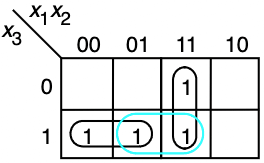Hazard Free Circuits
Static Hazards in SOP Circuits
Hazards are only really an issue for ASCs, since SSCs involve a clock.
See SOP.
- When circuits are implemented as a 2-level SOP, we can detect and remove and remove hazards by inspecting the K-map and adding redundant product terms
- When adjacent minterms are not covered by the same product term, then a hazard exists
Example

Example
